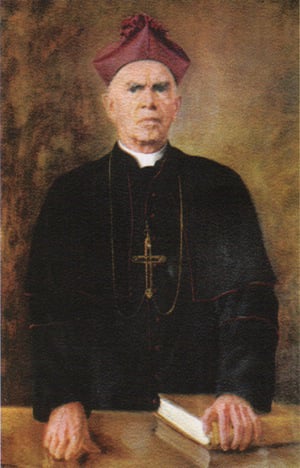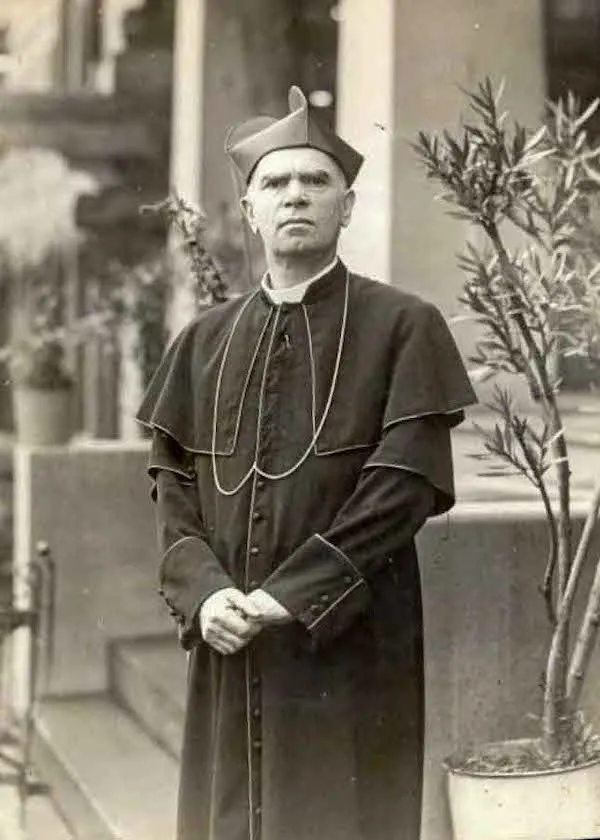On Easter Sunday, April 1, 1866, a son was born to Jan and Maria Hodur in the little village of Żarki, in the powiat of Chrzanów, about 35 miles from Krakow in the Austrian-ruled part of Poland which was sometimes called Galicja. He was given the name Franciszek (Francis).
The Hodurs were simple, hardworking, religious people who, with their seven children, eked out a living on their farm and through part-time labor (Jan was also a tailor). After a late start in his primary school education, Franciszek immediately showed scholarly promise and completed his high school education with honors on a scholarship at the prestigious St. Anne’s Gymnasium in Krakow, in 1889. After a brief hiatus in theatrical work, he enrolled as a seminary student in Krakow where he was able to take most of his course work at the renowned Jagiellonian University.
As a high school student and seminarian, Franciszek not only excelled in his academic work but also showed much concern for his people, especially the down-trodden and exploited peasants. His extensive readings ranged from the newly-issued social encyclical Reum Novarum of Pope Leo XIII to some of the socialist thinkers. An ardent follower of the activist Father Stanislaw Stojalowski, Seminarian Hodur was involved in a student group espousing Stojalowski’s program for peasant rights, education, and economic improvement.
In 1892, Franciszek Hodur, then with minor clerical orders, participated in a seminary “strike” for better living conditions. His role in this “insubordination,” noted by his authorities, meant a very uncertain future for him. Leaving Europe on the last day of the year, he embarked for the United States with the hope of a new beginning as a pastor to Polish immigrants.
Upon landing in New York, Seminarian Hodur “advertised” himself in a newspaper letter. He came to the attention of Father Benvenuto Gramplewicz of Nanticoke, Pennsylvania, who brought him to the Scranton Diocese where there was a shortage of Polish-speaking clergy. He was then sent to the Seminary at St. Vincent’s Benedictine Archabbey in Latrobe (known as Beatty) in the Pittsburgh area. After several months of additional studies (lectures were given to classes of immigrant students in Latin) he was returned to Scranton.
He received his major orders in one week and was ordained to the Holy Priesthood by Bishop William O’Hara on Saturday, August 19, 1893.
Father Hodur’s first assignment was the ethnically Polish Sacred Heart of Jesus and Mary Parish on Scranton’s South Side. As assistant, he distinguished himself not only as a religiously zealous priest, but he also involved parishioners in such activities as Polish patriotic programs, plays, and a parish library. He even edited a newspaper.
In 1895, Father Hodur was assigned as pastor to Holy Trinity Parish in Nanticoke, Pennsylvania. The organization of Saint Stanislaus parish in Scranton, PA on March 14, 1897 began a new period of activities and hard work for Father Hodur. Although the majority of the Polish people did find jobs because of their sincerity, cleanliness, and conscientious work, for years they were among the first to be fired and exploited. Therefore, the Polish National Catholic Church not only preserved and cultivated their spiritual and cultural heritage, but also became an oasis of national pride, social equality, and strength. Bishop Hodur cared for them, loved them and protected them.
He was to remain the leader of the church for fifty-six years. He became an instrument in God’s hands, teaching the Gospel of love and abolishing the spiritual and moral abuses of the “old” church. Bishop Hodur offered his followers the spiritual food they hungered for; he preserved their culture from a barbaric genocide; he offered them hope and saved them from persecution. It was the suppression of their faith and culture that led them to the organization of the Polish National Catholic Church. By organizing the church, by establishing a Fraternal Society – Spojnia, by founding many societies and organizations, Bishop Hodur carried with enthusiasm the banner of spiritual, cultural, and national freedom.
Prime Bishop Franciszek Hodur died on February 16, 1953 in Scranton, PA. He witnessed the Polish National Catholic Church grow from a single congregation of 250 families to 150 parishes in the United States and Canada, and 95 in Poland.
Bishop Hodur believed in his mission as a protector of the abused. And he did his best to effect and change their lives by setting a good example, by preaching and practicing the Word of God, and by teaching others to accept God’s Will in everything.


